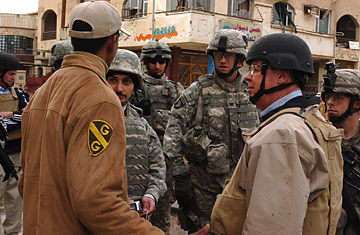
U.S. Senator Johnny Isakson from Georgia talks with U.S. soldiers in a Ghazaliyah market.
(2 of 2)
I have established relationships with the parents of sons who were lost in Iraq, and have tried to provide the comfort that I can to them and the thanks that I can to them for the sacrifice of their sons. I have done everything I could to see to it that wherever benefits to our National Guard were inappropriate given the fact that they are on the front line now, was rectified, and in large cases, we've done that. We need to make sure that whenever we have differences over what we should be doing, we never should ever have a difference over the full support of our troops deployed in harm's way, and I've always fought for that.
On the Walter Reed VA hospital
The building that brought about the controversy over Walter Reed — Building 19 — was disappointing in terms of its condition, but it was inappropriately depicted as characteristic of the treatment our soldiers were getting. I go to Walter Reed anytime there's a wounded Georgia soldier there — and I have been there many times. Rather than me giving you an opinion, I'll just quote one of my constituents whose son was injured severely. I went to visit [that soldier] at Walter Reed, and gave him my card and said to him: "Give me your parent's number, I want to call them to let them know that if there's anything you need while you're at Walter Reed that I can help you with, I'll be glad to do." And I called his parents that night — and this was back when that news was breaking — and the father said, "Well, one thing, for sure, you can do: I know there's been a lot of controversy going on, but I've been here for 10 days with my son, and he's getting the best care that anyone could possibly get."
On upcoming votes regarding the war's funding
I think the success our troops have had was born out of the debates we had [recently] on Iraq, which were decisive and exemplary of the mood we now have in Congress, which is basically very positive about the success we've had.
On his first visit to Baghdad
My first visit I flew in on a C-130, was put in a Blackhawk helicopter and flown in at low altitudes — evasive procedure — into the Green Zone. By 5 o'clock, they had us on helicopters, flying us out; we couldn't stay overnight. We never left the protection of the Green Zone. It was a substantially dangerous and hostile environment. The last time I went, which was in January, I landed in a C-130, drove in a Chevy suburban to the Green Zone, spent the night. The next day, I walked a neighborhood — now I had a bullet-proof vest and a helmet on — but walked through that village, met with 18 shop owners who had re-opened their shops based on grants from the United States provincial reconstruction teams and met with refugees who had come back from Jordan after being gone for two years. So the difference between the first visit, which was intimidating and hostile, and the last visit, which was hopeful, are remarkable. And the evidence of what Gen. Petraeus and the troops have done is evident to everybody that goes there. There is no dispute — Republican or Democrat — as to progress that has been made.
On the refugee crisis
Of course the number of Iraqis — we don't know how much — but a significant number of Iraqis fled. The estimates are as many as 2 million* (some say its nearly double that) into Jordan. I think there's about 700,000 in Jordan. In fact, I met yesterday with King Abdullah on the refugee issue. He was in the capital visiting with the Foreign Relations Committee, and he acknowledged that they still had 700,000 but there was some movement back, and they were trying to do everything they could to encourage that movement back. The fact that there is movement back is a ratification of the success of the surge, and the relative peace and stability that's come — still relative, still dangerous, but not nearly the hostility that was there.
On public support of the war
I talk to Georgia voters all the time and, quite frankly, Georgia has a significant military investment. We have 13 bases in the state. Most of the ground forces in Iraq go either through Ft. Benning, Georgia, or Ft. Stewart, Georgia. Georgians are very supportive of our men and women in harm's way. There are differences of opinion on the war, but in general, the public is supportive and, in general, I find [them] hopeful now because of the relative progress that has been made in the surge. But war is a tiring process on the soul, and anytime America has been deployed it causes concern on our people. I think everybody wants us to be successful, and they want it to be over. They want both.
